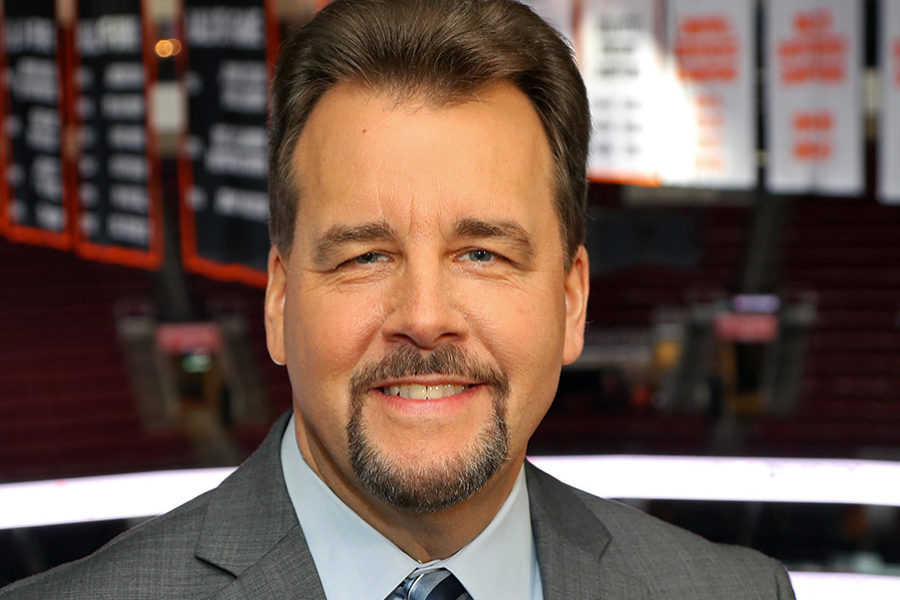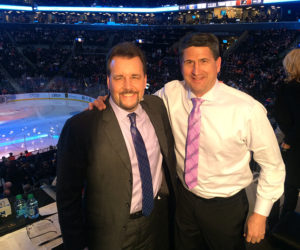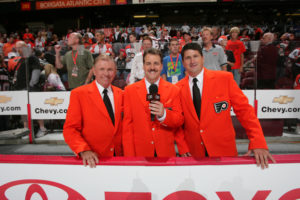
Minnesota Wild v Philadelphia Flyers November 11, 2017 at the Wells Fargo Center in Philadelphia, Pennsylvania.
Award-winning broadcaster has mastered two different sports
Growing up in Utica, NY, Jim Jackson loved sports and called himself a “wannabe athlete,” someone who had his moment of clarity when he was playing football as a high school sophomore.
It was a moment that steered him toward what has become an accomplished career as a broadcaster.
A football player got sick, and Jackson was promoted to participate in a varsity practice on the fateful afternoon. “They stuck me at middle linebacker, and I wasn’t big enough to be a middle linebacker,” Jackson, 55, a popular broadcaster with the Flyers and Phillies, said.
The team ran a fullback-dive drill. Jackson’s duty was to fill the hole and tackle a bruising fullback who weighed more than most of the players’ fathers.
Jackson can recall the fullback running toward him, and, well, not much else.
“Next thing I remember, I’m looking up at the sky and all the guys are around me,” Jackson said.
The fullback had run over him.
“Back then, they said you got your bell rung. It was no big deal,” he said. “I went into the locker room later and I was feeling lousy and I said to myself, ‘I don’t think I’m going to make it to the NFL.’ I knew then I had to find another way, whether through writing or broadcasting. That solidified the fact that I’ve got to find another way to be involved in sports.”
Jackson’s late father, John, a veterinarian, cultivated his interest in sports by taking him to minor-league hockey games, Mets baseball games, Giants football games, and Syracuse men’s basketball games.
“My mom always wanted me to take over his spot at the animal hospital, but I always had the sports passion,” said Jackson, the Flyers’ long-time TV voice. “I disappointed her, I’m sure.”
But not the fans who listen to the excitement in his distinctive voice as he does Flyers and Phillies games. Jackson was recently named the winner of the prestigious Bill Campbell Award by the Philadelphia Sports Writers’ Association. He will be presented the award, given for broadcasting excellence, at the PSWA’s 115th annual banquet Jan. 21 at the Crowne Plaza Hotel in Cherry Hill. Phillies pitcher Aaron Nola is one of the many other winners, and tickets are available at www.phillysportswriters.com.
“J.J. is the complete package for what you want from a play-by-play guy,” said Steve Coates, who now does color commentary on Flyers radio broadcasts but has worked with Jackson on TV and radio. “He has a complete understanding of the game, and his emotion is directly proportional to the theme of the game.”
Coates said Jackson was “overly prepared” in his research and “genuinely loves his job. And he’s excellent in working well with whoever his partner is.”
Keith Jones, a former Flyer who is currently one of Jackson’s broadcast partners, agreed. He called Jackson a “very enjoyable guy to work with. And he’s flexible to adjust to whatever the game presents. He never misses the big moments.”
Jackson went to Syracuse University and studied broadcast journalism before graduating in 1985.
“I was lucky enough to be there with lots of people who have gone on to bigger and better things in the business,” he said, mentioning broadcasters like Sean McDonough (Red Sox, CBS Sports, ABC, ESPN), Greg Papa (almost all San Francisco-area pro teams at some point), Mike Tirico (ESPN, NBC Sports), Todd Kalas (Astros), Dan Hoard (Bengals), and Craig Minervini (Marlins, Florida Panthers). At different times, Hoard and Minervini were his college roommates.
“It was great because it was only an hour from where I grew up in Utica,” Jackson said of his college days. “I had it easy. I grew up in Utica, went to Syracuse, went back to Utica and worked six years, and came to Philadelphia. I haven’t been all over the map like a lot of people.”
He has broadcast Flyers games for 25 years—the last 23 on TV, the first two on radio—and has done the Phillies for the last 12 seasons. Only the legendary Gene Hart (28 years) has been a Flyers play-by-play broadcaster longer than Jackson.
He gets this question asked frequently: Which is your favorite sport to broadcast?
“I always tell people I have a son who is a big strapping kid. He’s kind of quiet. And I have this tiny petite daughter who is very outgoing, and I love them equally,” he said, answering the question with an anecdote about his son, Johnny (named after his Jim’s father), 18, a junior hockey left winger for Tier III Wilkes-Barre/Scranton in the Eastern Hockey League, and his daughter, Deanna, 21, who is interning at a Philadelphia film-editing company.
“I mean, the two sports could not be more opposite, but I don’t have a preference. I love hockey for the action, the physicality. I love baseball for its pace. It’s a completely different pace, and the season is kind of a marathon and there are a lot of stories, and you get to cover the stories. I have no preference.”
Growing up in Utica, Jackson said, he was a “true four-for-four guy. I loved basketball, I loved football, I loved hockey, and I loved baseball. If I ended up doing play by play for football or basketball, I would have been just as happy. But as it turned out, an AHL team came to Utica and a minor-league baseball team was in Utica. I did those two sports and I ended up in those two sports.”
He began doing Flyers games in the 1993-94 season as their radio play-by-play voice, and he did some Trenton Thunder minor-league baseball games during the NHL lockout in 2004-05. “That’s kind of what helped me get the Phillies job,” Jackson said. “It would have been hard for me to submit a tape from 12 years earlier.”
In baseball, because there’s lots of time between pitches, Jackson has to have lots of background information ready.
“You do need to have lots of stories. I would say I use maybe 10 percent of my preparation in a hockey game. In fact, Gene Hart used to say that all the time,” he said. “He had that big black book of his (filled with stats). This was before the Internet, of course. I’d say, ‘Gene, you can’t use all that stuff.’ And he’d say, ‘No, I probably only use about 10 percent of it.’ I said, ‘Doesn’t it seem like a waste of time?’ And he said, ‘I never know which 10 percent I’m going to use.’ And he was so right on that. But in baseball, I’d say I use 50 to 60 percent of my research before a game.”
Jackson, a six-time Mid-Atlantic Emmy winner who lives in Gloucester Township, NJ, with his wife, Bernadette, did Flyers radio broadcasts for two years while Hart was doing the TV broadcasts. They traveled together and “I tried to sponge whatever I could from him because obviously he was one of the greats,” Jackson said.

Jim Jackson (left) and one of his Flyers broadcast partners, Keith Jones
When he became the Flyers’ radio voice a quarter-century ago, Jackson worked with Coates, and he was with Gary Dornhoefer when he first did TV broadcasts. Jones and Bill Clement now rotate as his TV sidekicks.
“I’ve been completely blessed with great partners, starting with Dorny,” Jackson said. “Coatesy helped get me involved my first two years, and Dorny got me through my deer-in-the-headlights moments early on in TV. I had done no TV whatsoever when I took that. And of late, of course, it’s been Keith Jones, Bill Clement, Chris Therien for a while, and now Taryn [Hatcher].”
Coates brought humor and energy, Jackson said, and Clement has “taught me a ton. I call him the Professor. Jonesy is just as sharp and as quick as anybody I’ve ever worked with, and Dorny, well, I used to say if I was ever in a war and wanted to be in a trench with somebody, he’d be the guy. You knew EXACTLY what you were going to get every day and you knew he had your back.”
Jackson said calling the Flyers’ 2-1 win over Pittsburgh in a 2000 playoff game—a five-overtime thriller that was the longest game in modern NHL history—and Jimmy Rollins breaking Mike Schmidt’s franchise hit record, are his favorite broadcast memories.
There are many other moments high on the list, he said, and he will never forget being in the Phillies’ 2008 World Series parade. “The amount of people and the amount of love being shown, I was completely in awe,” he said.
How close are the Flyers to having their first parade since 1975?

Jackson flanked by Flyers broadcasters Steve Coates and Keith Jones
Jackson believes the Flyers have a “real good foundation” and that they are “stockpiling talent” with their strong prospect pool. “Unfortunately, in hockey you can’t just go out and get one player [like in the NBA] and make your team better. It’s more of a team sport,” he said.
Jackson, mindful that the Flyers fired general manager Ron Hextall in late November because of a slow start and his failure to make a major trade, said it’s “really important for this franchise to win a playoff series this season and go on a run. The young nucleus is there, and the veteran core is still in its prime. That’s only going to last a couple more years, so the urgency is there.”

